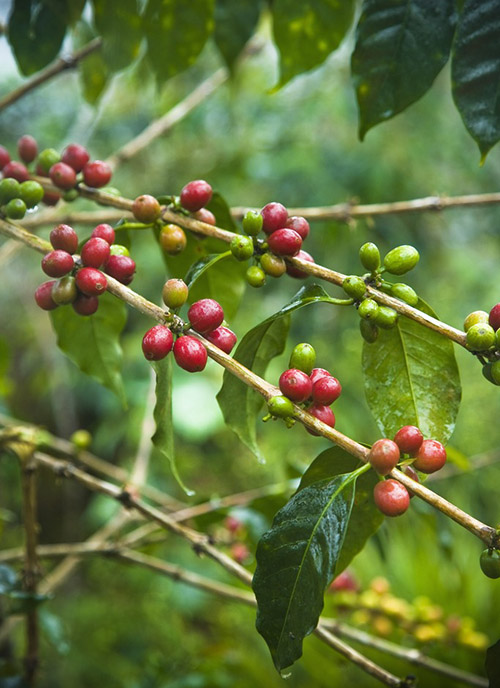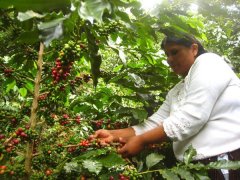Jackfruit, spice and wine G3 grade G1 in the primeval forest of Banchi Magi, Ethiopia
Boutique coffee (specialty coffee) is also called "specialty coffee" or "select coffee". It refers to coffee made from a small number of raw beans with excellent taste grown in an ideal geographical environment. Depending on the special soil and climatic conditions in which they grow, they have outstanding flavor. After strict selection and classification, this kind of coffee can be regarded as a selection of coffee beans because of its hard texture, rich taste and excellent flavor.

There are four types of coffee exported from Ethiopia: virgin forest coffee (forest), semi-virgin forest coffee (semi- forest), garden coffee (garden) and manor large area coffee (plantation).
Primeval forest coffee (forest) accounts for about 10 per cent of all coffee production and comes from southern and southwestern Ethiopia, such as (Bale, West Wolega, Bench- Maji, Keficho-Shekicho, Metu and Jimma). Primeval forest coffee has a natural resistance to diseases and insect pests, organic and dry aroma top high-quality flavor.
Semi-primeval forest coffee (semi- forest) is coffee farmers in the primeval forest coffee trees have special care, there are pruning coffee trees and weeds, as well as shade trees pruning, fruit ripening, then harvested and sold, this type of coffee accounts for about 35% of the total output.
Garden Coffee (garden) is now the main force of Ethiopian coffee. It is near the homes of small coffee farmers. The average planting area of each small coffee farmer family is less than one hectare. These small farmers form numerous cooperatives of different sizes, and the producing areas are also concentrated in the south and southwest, as well as in the east (Sidamo, Gedeo, South and North Omo). Hararghe, Wolega and Gurage Zones, East and West.), this type of coffee accounts for about 50% of all production.
Only the government system can have the financial resources for the cultivation of large-area plantation coffee, which accounts for only about 5% of all production.
This batch is the sun-drying class. Maggie G3 belongs to the primitive Forest Coffee (forest). It is an organic and natural coffee. It comes from the Banqi Maggie Forest Coffee producer Farmers' Cooperative Union (Bench Maji Forest Coffee Producer Farmers'). Cooperative Union Ltd) export, this company is due to 64 major cooperatives and set up an export company, this life bean appearance, consistency, freshness to dry aroma and flavor are excellent, in the dry aroma performance is very top, flavor features: Bordeaux honey, ripe fruit, spices, wine, dark chocolate. Light fermented wine, delicate fruit acidity, berry aroma, cocoa flavor, clean and balanced taste, long and lively fruit flavor.
Important Notice :
前街咖啡 FrontStreet Coffee has moved to new addredd:
FrontStreet Coffee Address: 315,Donghua East Road,GuangZhou
Tel:020 38364473
- Prev

Rich fruit flavor of blackcurrant cranberry in Gatugi processing plant of Jiatugi, Nyeri, Kenya
Boutique coffee (specialty coffee) is also called specialty coffee selection coffee. It refers to coffee made from a small number of raw beans with excellent taste grown in an ideal geographical environment. Depending on the special soil and climatic conditions in which they grow, they have outstanding flavor. After strict selection and classification, this kind of coffee is hard in texture, rich in taste and stylish.
- Next

90 + boutique coffee Ethiopia NistuRuz Nisuluzhu / rosemary Qingfu water kumquat juice
Boutique coffee (specialty coffee) is also called specialty coffee selection coffee. It refers to coffee made from a small number of raw beans with excellent taste grown in an ideal geographical environment. Depending on the special soil and climatic conditions in which they grow, they have outstanding flavor. After strict selection and classification, this kind of coffee is hard in texture, rich in taste and stylish.
Related
- Does Rose Summer choose Blue, Green or Red? Detailed explanation of Rose Summer Coffee plots and Classification in Panamanian Jade Manor
- What is the difference between the origin, producing area, processing plant, cooperative and manor of coffee beans?
- How fine does the espresso powder fit? how to grind the espresso?
- Sca coffee roasting degree color card coffee roasting degree 8 roasting color values what do you mean?
- The practice of lattes: how to make lattes at home
- Introduction to Indonesian Fine Coffee beans-- Java Coffee producing area of Indonesian Arabica Coffee
- How much will the flavor of light and medium roasted rose summer be expressed? What baking level is rose summer suitable for?
- Introduction to the characteristics of washing, sun-drying or wet-planing coffee commonly used in Mantenin, Indonesia
- Price characteristics of Arabica Coffee Bean Starbucks introduction to Manning Coffee Bean Taste producing area Variety Manor
- What is the authentic Yega flavor? What are the flavor characteristics of the really excellent Yejasuffi coffee beans?

